Genre: Comedy (potentially Romantic Comedy)
Premise: Based on a story that went viral on Instagram, a man shows up in Chicago for a bachelor party only to find out that the rest of the party is stuck in another state. But he decides to do the bachelor activities anyways!
About: This script finished with 8 votes on last year’s Black List. I can’t find anything on the screenwriter so I’m assuming she’s new to the game.
Writer: Madeleine Paul
Details: 110 pages
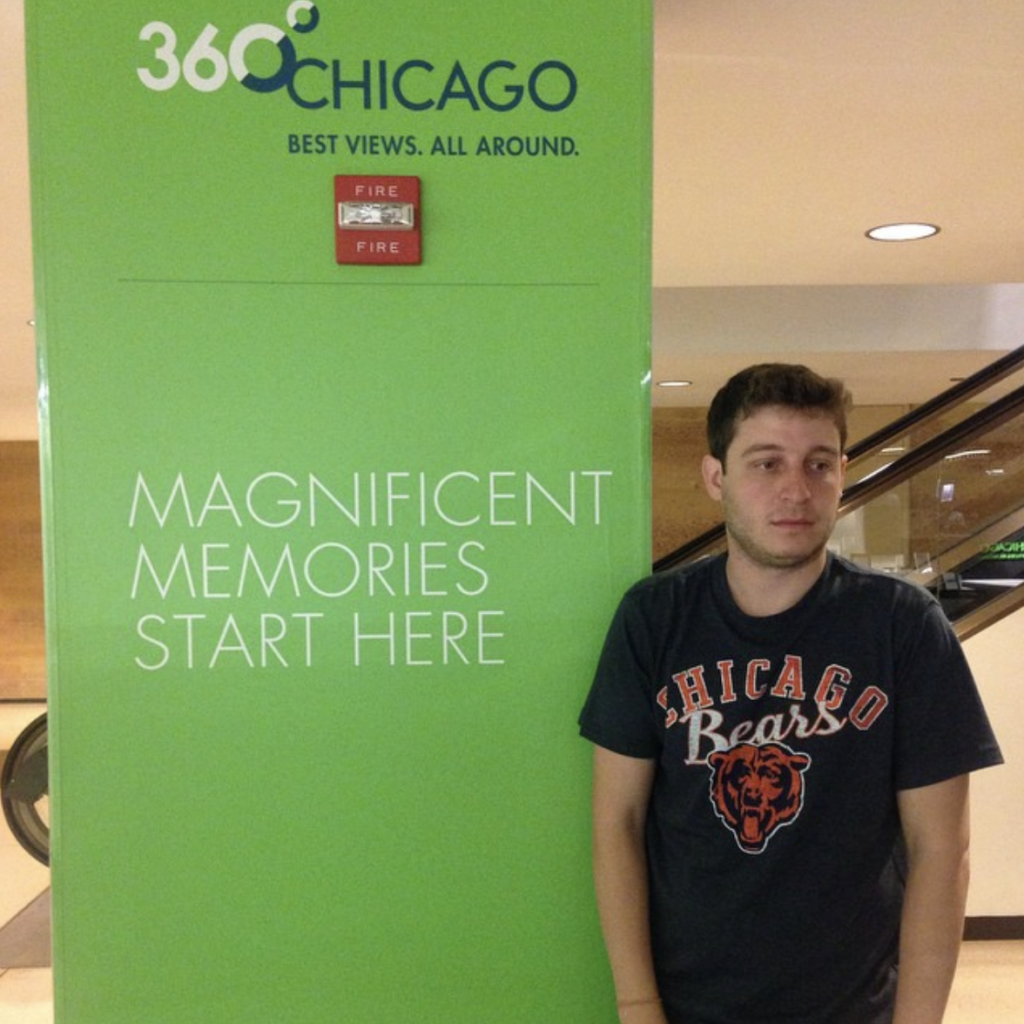
Chicago Chicago!
I like this premise. Not just because it takes place in my home town. But it’s a fun spin on a common trope – the bachelor party comedy. The key to this specific concept working is the irony. Bachelor parties are PARTIES. They’re supposed to include a GROUP of people. So the second you say there’s only one person in the party, you’ve got a concept.
However, this idea is not without concerns.
Just to be clear, every script you write will have concerns. It’s how you address those concerns that will result in your script being a winner or a loser.
The big concern here with Chicago For One is – there’s no one to bounce off of. That’s where the large majority of the comedy in these bachelor party scripts comes from. The Hangover and Bridesmaids are at their funniest when the group is sparring with each other. What happens when you don’t have that? We shall see!
Cam is a 28 year old dude who works too hard. He’s also in one of those relationships where his better half doesn’t like him that much. Even worse, he doesn’t realize it.
In the meantime, workaholic Cam has to reject his best friend, Brad, who’s getting married soon and is having a bachelor party in Chicago. Brad is desperate for Cam to come but Cam keeps saying no because of work. That is until his girlfriend dumps him. Screw it, Cam says, and finally agrees to come to the bachelor party.
In one of the most logistically complicated setups I’ve ever come across, Brad, the groom, is here with Cam in New York, but for some reason he’s set the bachelor party in Chicago. So Cam flies to Chicago to go to the bachelor party but everyone else in the party, including Brad, who are still in New York, get stuck there because of weather.
Cam doesn’t know this yet and heads to the first stop on the bachelor party tour, a boat tour of the city. But that’s when he finds out that this night is going to be him and him only. The tour boat lady, Kelly, gives him this brilliant idea to go to all the bachelor events anyway and document it on Instagram. She even takes the first picture of him by himself and posts it.
Cam starts posting pictures of himself everywhere (the bean, the zoo, the aquarium, the Bears game) purposefully looking sad. Along the way, his pictures start going viral and he gets recognized. Surprinslgy, most people are supportive, rooting him on and encouraging him to say in Chicago for the full weekend. Cam reunites with Kelly, realizes there’s a spark there, and is starting to think this lonely bachelor party may be the best thing that ever happened to him. That is until his ex shows up, wanting to give their relationship another shot.
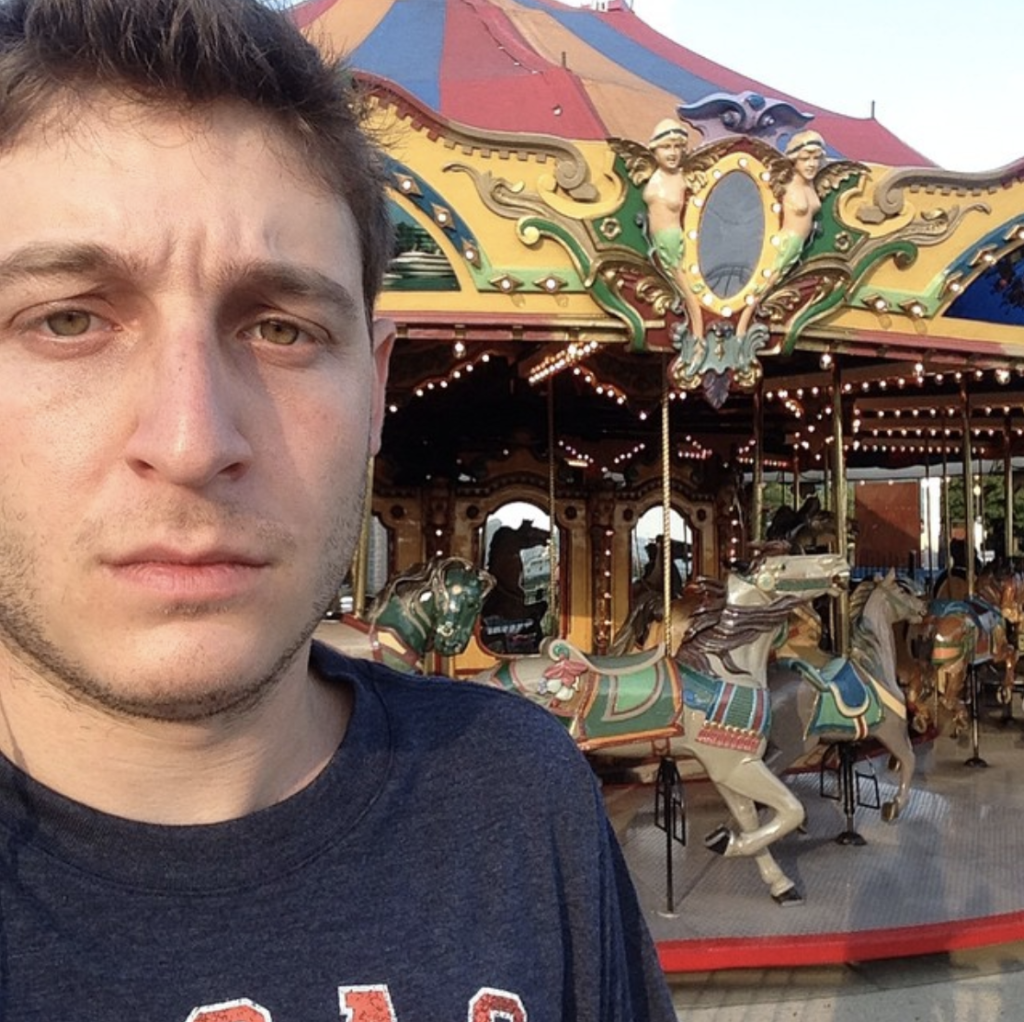
The good news is, I can see this being a movie. Not a huge movie. But a movie nonetheless. It’s got that marketing angle to it that does a lot of the work for you.
But the script needs a lot of work.
First, it violates one of the most important rules of screenwriting, which is to start the story as late as possible. “Chicago For One” spends the first ten pages painstakingly winding its way through a work plot that has nothing to do with the story.
This story needed Cam to get dumped so he could get to Chicago for the bachelor party ASAP and start the fun. Spending all this time inside a boring work subplot destroyed the beginning of the script.
I think sometimes we say to ourselves, “Well, we can’t just jump straight to the craziness.” You can’t have Alan, Stu, and Phil wake up from their crazy Vegas night on page 3. You need to use the first act to set them and the situation up first. But what if there isn’t much to set up? Do you set up anyway?
We could’ve easily had Cam dumped and set up that the rest of the bachelor party didn’t make it to Chicago by page 5. Probably even sooner. So if you’re not going to move things along, you gotta give us some story reasons why. And this script didn’t have that.
Also, work subplots are interesting because, on the one hand, you want to create context for your protagonist. You want to see that he has a real life so he feels real. However, it’s a case by case basis for whether to explore their work. In some movies it matters. In other movies it doesn’t.
For example, we don’t go into any relevant work subplots in The Hangover. So there was no need to get into minute detail about what they did and what the stakes were for them getting a promotion at work or what have you. However, in a movie like Pretty Woman where the whole point of the movie is that our main character needs a companion for the week while he puts a business deal together – that’s when you need to know something about the hero’s work.
You didn’t need to know anything about Cam’s work here. It’s not relevant to the story. And if you’re ever unsure about whether to include work stuff or not, put yourself in the mind of the audience. They’ve come here to see what kind of movie? In this case, a guy doing a bachelor party by himself. That’s not a concept that people want work life details on. They just want to see the fun stuff.
So why did it make the Black List, Carson?
These days, figuring out why something made the Black List is a lot like in the old days, trying to figure out why something sold. There’s always some behind-the-scenes details we’re not privy to. I remember when that totally bonkers script about the world blowing up that felt like it was written by a 3rd grader sold and everyone was wondering, HOW DID THAT SELL!? And it turned out to be Channing Tatum’s best friend and he made the studio buy the script before agreeing to star in another one of their movies.
I don’t think that’s the case here. It probably has something to do with the viral story being known and the script going out wide with a little buzz behind it because of that and the concept was memorable enough to get some votes. It’s a reminder that concept is king. It can make up for a lot of weaknesses.
So is there anything good here?
There were a few funny moments. Like when people recognized him. “Wait, wait, wait. You’re that guy. That… sad guy. Lonely guy.” Lol
And once it gets to him actually going out and doing things, it gets better. Because that’s what we came for.
And I liked the spirit of the story. It’s one of those feel-good movies, which is nice to see in a sea of scripts about sexism and racism and anger and super serious intense unhappiness. Chicago For One does a nice job reminding you that most people are good. That when someone’s having a bad day, people want to help, want to offer you an olive branch. That’s when Chicago For One was at its best.
I just don’t think the writer was ready to give this story the execution it required to deliver that feeling all the way through. There’s a lot of technical stuff that they need to improve on to make the story read seamlessly. With some guidance and a handful of rewrites, it could be a fun movie.
[ ] What the hell did I just read?
[x] wasn’t for me
[ ] worth the read
[ ] impressive
[ ] genius
What I learned: I’m going to say this as clearly as possible. You will never, in your life as a screenwriter, write something that you know is filler and get away with it. The reader will ALWAYS KNOW it’s filler. You can’t fool them. If there’s one thing readers and audiences are experts at, it’s recognizing when the script or movie is spinning its tires. There was so much in this first act that was unnecessary. It read like filler and forced the script into a difficult situation whereby it needed to save itself by the second act. Never write filler just to meet page markers. If you can get to the meat of the story before the end of the first act, on page 25, then get there. We don’t need to sit around for 15 extra pages just so you can meet some screenplay book’s requirement of when the first act is supposed to start.
What I learned 2: I do think these viral stories are good opportunities for savvy screenwriters to seek out. Zola was another recent one. Stuff that has gone viral is one more bullet in your marketing chamber for when you’re pitching something. It gives your script automatic cache, which results in interest from people around town. And, as we can see, the more places a script gets sent, the more people read it, which means the more people who can potentially vote it onto the Black List.
Sideways meets A Christmas Carol in Alexander Payne’s latest project.
Genre: Drama
Premise: A professor at a prestigious all-boys academy in 1970 is stuck babysitting the one “holdover” over Christmas break, a student whose parents have ditched him for the holiday.
About: This is the big re-teaming (it’s Re-teaming Week here at Scriptshadow!) of Alexander Payne and Paul Giamatti (Sideways). The writer, David Hemingson, has been writing on TV shows since the 90s! This is a major departure for him and a huge new direction for his career. The Holdovers is filming in New England as we speak.
Writer: David Hemingson
Details: 117 pages
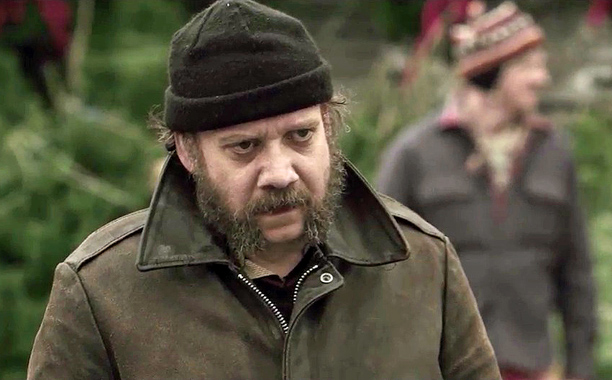
It’s crazy how dramatically one bad movie can damage a filmmaker. Even if that filmmaker has had decades of success. Payne, a darling in the indie world and a two-time Oscar winner, hasn’t made a movie in five years. All because his last film, Downsizing, was too weird and lacked a compelling plot.
But alas, we should not be punishing those who take creative risks. We should be rewarding them! In theory, at least. Let’s be honest. We’re all supportive of taking risks unless those risks turn out to suck hay bails.
50-something professor, Paul Hunham, described as “a heap of rumpled corduroy” is the most hated professor at Deerfield Academy (circa 1970). Paul is the only professor unafraid of the school’s prestigious alumni, as he proves by flunking a senator’s son, which prevents that student from being able to go to Princeton.
Because Paul is such a Scrooge, he doesn’t have any friends. Therefore, when winter break comes around, Paul has nowhere to go, and is assigned to take care of the “holdovers,” those kids who couldn’t go back to their families over Christmas for various reasons.
At the top of this reject list is 15 year-old Angus Tully, whose presence as a holdover is the direct result of his mom getting re-married to some loser who would rather go on a honeymoon than be around his new step-son. And hence the chip-on-his-shoulder Angus must stick around at a dead campus with nothing to do. A kid’s worst nightmare.
To make matters worse, all the other holdovers leave. That means it’s ONLY Paul and Angus left. And neither of them want to be anywhere near each other. They endure this for a while, having meals and studying under a series of angry glares. But they ultimately get invited to a Christmas party by a fellow female teacher, Miss Crane, who Paul has a crush on, and things pick up a bit. This begins an unexpected friendship between Paul and Angus, even if it is one explored primarily under duress.
The Holdovers feels like it’s made for a targeted audience. By that I mean, people who have gone to school at one of these all-boys academies. It’s very specific in that way, which made it hard to relate to.
And, unfortunately, I think the script made some questionable creative choices that prevented it from being better. For one, the dynamic between Paul and Angus wasn’t charged enough. Angus kind of doesn’t like Paul. Paul kind of doesn’t like Angus.
I don’t like “KIND OF” conflict. I like “ACTUAL” conflict.
There was another kid named Jenesen who was a total brat. Just a bad dude. He felt like a much bigger adversary for Paul. Those two would’ve gone at each other relentlessly and, therefore, made for a better script, in my opinion.
Speaking of, the original setup, which had five kids on holdover, sounded much more promising. Now you’ve got Dead Poet’s Society meets The Breakfast Club. A coming-of-age film with a group of kids getting in trouble. That’s a winning formula that has delivered time and time again.
The mismatched duo is also a winning formula. But only when the two opposing characters have clear conflict with one another. And like I said, these two only have “kind of” conflict with each other.
Taking this one step further, one of the big themes of the script is entitlement. These are all rich kids who have been handed everything in life. So keeping them here at this rich kid’s school doesn’t really test that. What would’ve been better is if they had to leave the school for some reason (it was temporarily shut down over the break) and stay in town, in a world that’s completely foreign to what they’re used to.
But again, we didn’t even have a group of kids. We decided to go with one kid.
I know it’s stupid to write reviews whose main focus is, “This is what I would’ve done!” But I bring it up to remind screenwriters that you always have choices in your story. And you should be asking yourself, “Is this the most dramatically interesting choice? Is there a different route that’s potentially more entertaining?”
We get major tunnel vision as screenwriters. We get so stuck on that original idea we wanted to write that we don’t see there’s a much better version of it right around the corner. This especially happens if you’re drawing on your own life experiences. You’re likely to lock in on exactly what happened to you and write that story only. Which is myopic. You have to be more dynamic as an artist.
I brought this up a couple of years ago with the movie “The Big Sick.” Now to be clear, The Big Sick was a great movie. I don’t think it’s bad by any means. But if you’re looking at the script objectively, they missed a much more dramatically interesting opportunity.
That film was about how Emily goes into a coma and Kumail has to deal with her parents during the experience. But Kumail had next-to-zero conflict with her parents. So that storyline wasn’t very compelling. Meanwhile, Kumail’s parents did not want him marrying a white woman under any circumstances. They wanted him marrying a Pakistani. Therefore, the better person to put in the coma would’ve been Kumail. That way, you would’ve put the characters who had the most conflict with each other – Emily and Kumail’s parents – around each other the whole time.
Of course, that wasn’t what happened to real-life Kumail and real-life Emily, and therefore it would’ve been difficult for them to imagine that version of the story. But the point is, you shouldn’t lock yourself into a particular storyline without considering if there’s a better dramatic option.
With all that being said, The Holdovers does come together in one of those warm Christmas-y ways where you feel good cause everyone takes down their walls and connects with one another. I can imagine watching this on Christmas Eve and feeling that good “everything’s right in the world at least for this moment” feeling that other good Christmas films like It’s A Wonderful Life give you. It’s just a hard script to wrap your head around because it keeps changing into different movies as it goes on and by the time you figure out what the actual movie is, you’re thinking, “Why didn’t we just start with this?”
[ ] What the hell did I just read?
[ ] wasn’t for me
[x] worth the read
[ ] impressive
[ ] genius
What I learned: I know some of you are terrified of character descriptions. I was once terrified of them as well. So here’s a tip. Don’t write clever character descriptions unless you’re good at them. And if you do, don’t overcomplicate them. Clever character descriptions from writers who aren’t naturally good at them are too long and come off as try-hard. Here’s an example of what I mean: “TREY, 31, has a dollar to his name but makes up for it with a million dollar smile.” What is this other than, “Look at me?” It emphasizes clever over information. If you’re going to be clever with a description, do it AS SIMPLY AS POSSIBLE. That’s why Paul’s description is so good. “A heap of rumpled corduroy.” Five words and we get it. The simpler you keep the clever description, the more likely you are to pull it off.
What I learned 2: If you want to attach Paul Giammati to your project, write a Christmas movie. This is his third Christmas movie (All is Bright and Fred Claus are the other two). He obviously likes the holiday.
The director and the writer of “Seven” are back in the saddle again for this wild and disgusting short movie.
Genre: Fantasy/Period
Premise: A ship sailing through the ocean is boarded by a giant man-eating crab that demands to be taken to a highly populated island where it can feast to its heart’s content.
About: David Fincher! Andrew Kevin Walker! You can watch this short film right now on Netflix’s 3rd season of Love, Death, and Robots!
Writer: Andrew Kevin Walker (adapted from short story by Neal Asher)
Details: 21 minutes
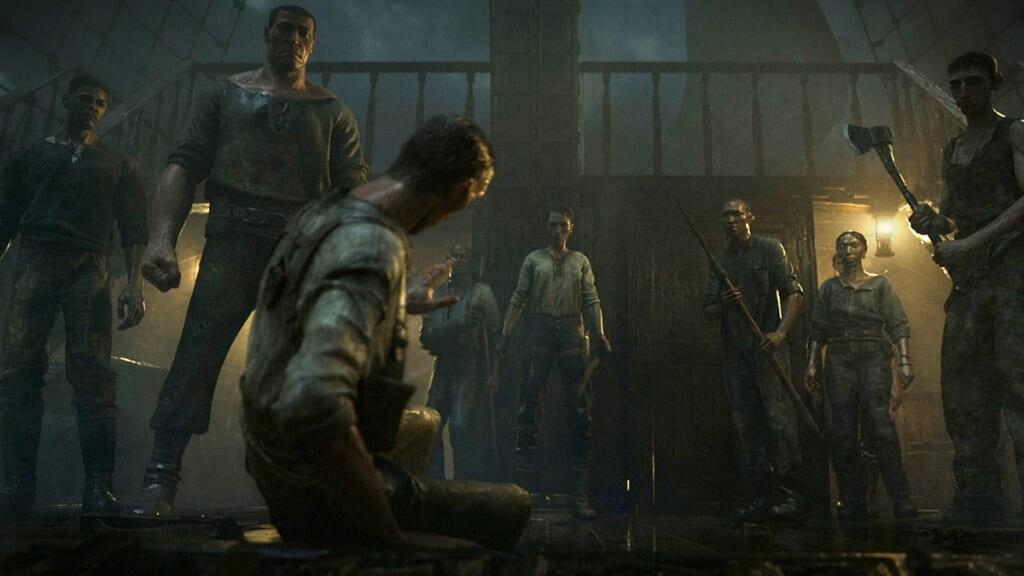
You wonder why it took these two – Walker and Fincher – so long to reconnect. They’re making that assassin film, “The Killer,” with Michael Fassbender. I guess this is their warm-up before the big match. And boy what a warm-up it is.
I haven’t watched all of the Love, Death and Robots episodes from Season 3 yet. But what I can tell you from watching this season’s current promotional title, Jibaro, and episodes from previous seasons, is that the creators continue to make the same mistake, which is that they use the medium as a way to play with toys, not tell stories.
Jibaro, which follows a group of 17th century soldiers who get attacked by an evil water nymph, isn’t bad. But all you have to do is watch Bad Traveling to see why Fincher is so far ahead of these other guys. Sure, Fincher likes to play with toys as well. But he understands that, at the end of the day, if we aren’t emotionally connected to the characters, and there isn’t a compelling story at the center of the movie, and that story isn’t structured properly to build suspense, engage in conflict, then pay off everything that’s been set up, then you’re just @$%&ing around.
This latest story of his plays with one of the most powerful tools available to a storyteller. I’ll tell you what that is right after I summarize the plot…
Presumably set several centuries ago, a sea ship is attacked by a giant crab-like monster. After killing the captain of the ship, the crab burrows its way into the ship’s hull. The ship members draw straws on who has to go down there and face this thing to figure out what it wants.
A Machiavellian crew member named Torrin draws the short straw, goes down to the crab, who, through the voice of one of the killed crew members, explains that he wants to be taken to a specific island that is full people so that he can feast to his heart’s desire.
Torrin, who has now claimed captain’s status, relays this demand to the rest of the crew but suggests an alternative. They take Crabby to a decoy unpopulated island, one he’d be none the wiser about, to save the innocent people of the first island.
The crew isn’t sure. If the crab figures out what they’re doing, he might eat all of them up. So Torrin decides to put it to a silent vote. He hands out pieces of paper and everyone anonymously votes which island to send the monster to. Torrin then informs them that he tricked them, secretly marking each scrap of paper so that he knew who the cowards were, aka, the people voting to send the crab to the populated island.
Torrin shoots those two cowardly voters dead.
The trip to their destination will take a day and a half, which poses a big problem. Crabby is VERY HUNGRY. He needs feeding every few hours. Which means that decisions will have to be made on which members get picked for feeding time. As the trip draws to a close, Torrin will make a dangerous decision that will determine who gets off this boat alive: him, or that darn crab.
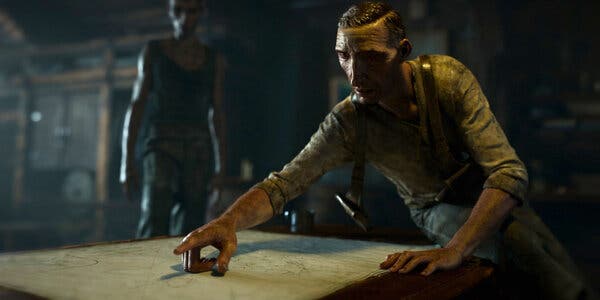
This was a REALLY good short film, guys.
All short film directors and writers need to study it because, like I said, it wasn’t just about the toys. It’s about a great story with a clear beginning (set up the problem that leads to the objective), middle (complications arise which make achieving the objective difficult), and end (they either achieve the objective or fail).
But what really stands out to me about this story is the focus on a very powerful writing tool: CHOICE.
You want to put your characters into multiple situations where they have a CHOICE to make. The more difficult the choice is, and the bigger the stakes are attached to that choice, the more entertaining that plot point is going to be.
One of the first CHOICES in Bad Traveling is, who’s going to go down and see what the crab wants? Note how big the stakes attached to this choice are. Whoever gets picked to go down there is very likely going to be killed. They just saw this thing massacre half their crew.
Next up, they learn that this thing needs to be constantly fed. Which means they need a body to feed to it right away. That’s the next choice. Who’s going to be the meal? Note how the stakes to this choice are even higher than the previous one! Cause this person is definitely dying.
Next up, we have the choice of which island to go to – the populated or unpopulated one. This choice brings with it more complexity. The decoy island is further away. Which means more crew members will have to be fed to this monster if they choose this route. Also, there’s a moral twist to the choice. You can save yourself but kill others by choosing the populated island. Or save others and risk your life if you choose the decoy island.
That’s when “choice” becomes really interesting in storytelling – when there aren’t easy answers, when there are more than a single element attached to the choice.
I’m telling you, if you want to write a good scene in the screenplay you’re working on right now, come up with a scenario where your characters have to make a difficult choice and there are high stakes attached to that choice, and everybody’s decision affects everybody else. You’re getting a lot of storytelling bang for your buck out of that scenario.
In addition to Bad Travelling being a great lesson on “choice” in writing, it’s just a great script in general. One of the ways I can tell that the writer did his job is when we encounter a common scenario and the writer has found a way to explore that scenario beyond its obvious outcome.
For example, when they take the votes for which island to go to. Traditionally, these scenes end with the orchestrator reading the votes and informing everyone else of the decision. But Andrew Kevin Walker took this scenario one step further by having Torrin inform everyone that he’d secretly marked each piece of paper to weed out the cowards. Any time you can take a trope and expand it into something new or unexpected, you’re doing your job as a screenwriter. If you’re always taking those moments to their expected logical conclusions, your writing is never going to shine.
The team even got the basics right. There’s a heavy ticking time bomb here since this monster needs to be fed. Every delay has the potential to take another life. Which means the story moves along quickly. They also introduce complications. No pursuit should ever be simple. So at one point, the crew tries to kill the captain, which he fights off and survives.
All around, this is a great short film on its own merit, as well as a great short for screenwriters to study. I loved it.
[ ] What the hell did I just read?
[ ] wasn’t for me
[ ] worth the read
[x] impressive
[ ] genius
What I learned: The double-twist. Why get single mileage out of a twist when you can get double mileage! Spoilers: Torrin reveals after the vote that he tricked the crew to weed out the cowards. He then kills the two cowards. Later, when Torrin is with his closest confidant, he tells him he lied about the voting. It wasn’t two crew members who voted for the cowardly option. It was all of them. He then pushes the confidant (the last crew member besides himself) through a hole on the deck, where he falls into the crab’s feeding room.

As we ramp up to next week’s debut of the Obi-Wan Kenobi show, the Star Wars heads have reluctantly started doing press to build excitement for the Disney Plus series. I say “reluctantly,” because Kathleen Kennedy hates press. She hates it because any discussion about the background workings of Star Wars will eventually lead back to her and any discussion about Kennedy ultimately shines a spotlight on the fact that she hasn’t done a very good job.
There are some who would contest this point. Four of the five Star Wars movies under her watch made over a billion dollars. And the instant success of The Mandalorian helped spawn a giant batch of new Star Wars shows for Disney Plus. But as is the case with most things, the Sith is in the specifics.
Kennedy is personally responsible for sending the new trilogy off a cliff. The fact that it ended with even a modicum of the brand still intact is a minor miracle. She chronically changes her mind, hiring and firing everyone under the sun. This has turned every established filmmaker against the Star Wars brand, which is why nobody big will touch the franchise.
We’ve gotten a new peek behind the curtain in the now annual Vanity Fair Star Wars photo shoot article. Kennedy was mostly tight-lipped, as she knows that anything she says will be seen negatively by the fans. But she did admit that recasting Harrison Ford was a mistake and seemed to imply that, moving forward, they’re going to perfect this digital likeness technology.
In addition to Kennedy’s comments, we learned that Dave Filoni was vehemently opposed to Baby Yoda. That was shocking. We also learned that Spider-Man director Jon Watts has a Goonies-like Star Wars show in development, as it will follow a group of young kids in the Star Wars universe.
All of this got me thinking about how the Star Wars brand has fared since Disney bought it. And I thought, what better way to express my thoughts about the post-Lucas era than with a list! So I’m going to rank the 20 biggest Star Wars elements since the acquisition. These include movies, shows, characters, creators, and overseers. Anything Star Wars since 2015 is in play. Read on. You might be surprised!
Note: Excuse some of the snarkiness. I get very passionate when I write about Star Wars!
20) Maz Kanata – Maz Kanata represents, ironically, just how big of a genius George Lucas was. Because when we meet a character like Yoda, we don’t question why he was made or how he was made. He just “is.” That’s how convincing the character is. But Maz Kanata shows us just how hard it is to create a weird character. There’s no roadmap to weirdness. It’s a gut feeling you go with. That’s what Lucas was a genius at. He’d put a stormtrooper on a giant lizard, riding it like a horse, and someone would ask him why he did that and he’d shrug his shoulders and say, “Ehhhhh, it’s whimsy.” The new trilogy misses Lucas’s whimsey. And the failure of Maz Kanata embodies that loss.
19) Rose Tico – There may not be a bigger example of a director not understanding the movie he’s making than the creation of Rose Tico. I know people have been trying to pretend Rose Tico is popular or something ever since the film came out. She’s not. If you ever want to see how much a Star Wars character is liked, check out the toy line. That’s where you know something is popular or unpopular. And can you get Rose Tico action figures for micro-pennies on the dollar if you want her. It was a badly conceived character. It was bad casting. Trying to fit her into a love story was a terrible decision. She didn’t work on any level.
18) Solo – I wasn’t a huge Alden Ehrenreich hater. I thought he did a pretty good job as Han Solo. The problem was he was in a movie that never felt necessary. But there were all sorts of choices that led to this film’s demise. I remember being a month out from this film’s release and there being zero awareness that it was coming out. Nobody knew. Of course you’re going to have a terrible opening weekend if nobody’s talking about a Star Wars movie a month before it comes out. Also, the film felt rushed. I remember watching it and thinking, “This looks really dark. I can’t tell exactly what’s happening.” I got the feeling that the film was so rushed, it didn’t have time to go through the proper post-production channels where they take care of stuff like that. It was just a disaster pretty much from the get-go.
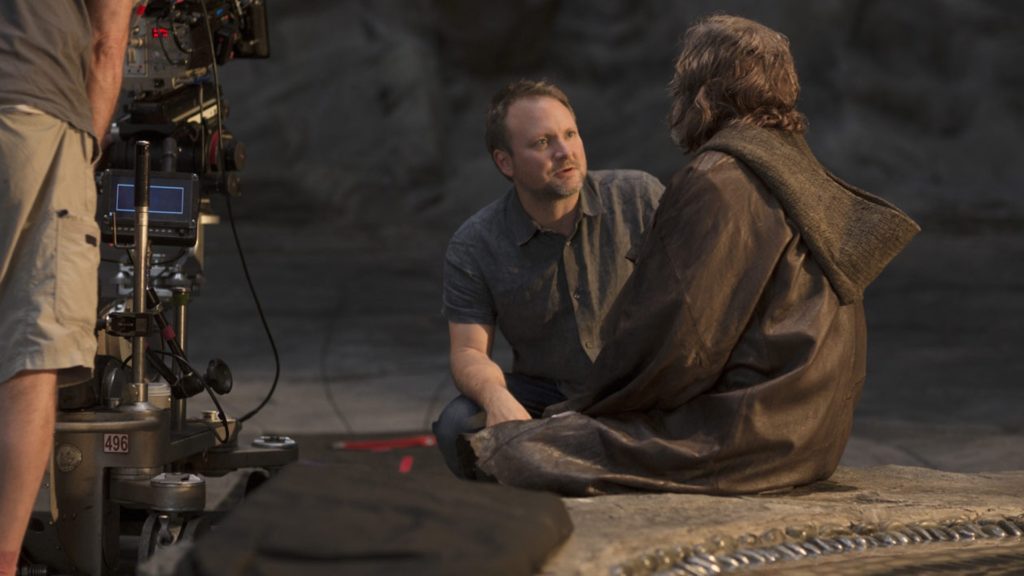
17) Rian Johnson – Rian Johnson simply never understood Star Wars. What he understood was his weird quirky indie film sensibility and he used Star Wars as a trojan horse to give one of those indie stories the big-budget treatment. The result was a couple of memorable moments, but overall, a complete misread of the mythology, which culminated in the assassination of the series’ lead character, Luke Skywalker. If that wasn’t bad enough, he gave the series nowhere to go in the final film, forcing JJ Abrams to bring back a dead bad guy. Johnson is one of the worst decisions the Star Wars brand has ever made.
16) Finn – Let’s be honest. Finn ended up being a disaster. And it didn’t help that the actor who played him, John Boyega, had a public meltdown in the middle of it all. There’s so much that went on here, it’s hard to pinpoint where the blame lies. But I think I have to blame Rian Johnson. JJ clearly had a bigger story in mind for Finn. Rian, meanwhile, had no idea what to do with him. So he forced a love story onto two characters with zero chemistry. Word on the street is that JJ wanted Finn and Rey to end up together but Disney said no because he was black. It’s up to you if you decide to believe that. But clearly all sorts of behind-the-scenes issues contributed to this character imploding. Cause he was actually kinda cool in the first film.
15) Poe Dameron, Jyn Erso – Never have two characters lacked personality more than these two. They were soooooo so so so very boring. Just writing their names down made me bored. Jyn Erso is an interesting case because word on the street is that the original performance of the character made her seem like a b*tch. So they took out all of the b*tchy moments, which is why the character seems so lifeless. Cause she wasn’t allowed to display emotion. Poe is different in that he’s a high-energy guy. So he *should* be exciting. Yet he, too, was boring. I think in JJ’s attempt to not make him a Han Solo clone, he stripped away any negative sides to Poe, and, in the process, stripped him of the duality many characters need to come across as complex.
14) Cassian Andor – Never have I seen a franchise try to push a character who didn’t deserve it more than Star Wars has tried to push this character from Rogue One. The character is weak. The actor isn’t very good in the role. Literally nothing about the character pops off the screen. And now we’re going to get an entire series of him! Talk about a weird decision. The series is being written and directed by Tony Gilroy, who’s openly admitted he doesn’t even like Star Wars! So we’re getting a show about a character nobody likes written by a guy who doesn’t like the world the character exists in. Buckle your seat belts for six episodes of bounty hunting boredom.
13) Kathleen Kennedy – You can’t completely poo-poo what Kennedy achieved. She picked the perfect director to bring the series back to life, which resulted in an unprecedented 2 billion dollar box office haul. She’s also spearheading a gigantic property that has a lot less certainty than her in-house sibling, Marvel. Those guys just have to find a popular comic run and turn it into a movie. Star Wars is much more of a guessing game. And that’s the problem. Kennedy doesn’t understand Star Wars and therefore guesses badly. I don’t know if “Solo” would’ve been a masterpiece had Lord and Miller not been fired by Kennedy. But I know for a fact it would’ve been better than that vanilla ice cream excuse of a movie they came up with. Kennedy just doesn’t “get it,” and it seems that whenever Star Wars has a hit, it’s because of someone else, not because of her.
12) Dave Filoni – I go back and forth on Filoni. I know there isn’t a bigger Star Wars fan in the universe. And I love the story of him moving up the ladder from a research assistant at Lucasfilm to directing live-action episodes of Star Wars. I can only imagine how exciting that must have been for him. Here’s my issue with Filoni though. It seems as if the only reason he got the job is because he was the only person in Lucas’s orbit who unabashedly liked the prequels. Lucas got hammered on those prequels so much that meeting someone who actually liked them created a Stepbrothers moment (“DID WE JUST BECOME BEST FRIENDS??”). From that point on, he was pretty much anointed a superstar in the company. And he could do no wrong. Therefore, even though he’s achieved great things at Lucasfilm, you still get the feeling whenever you watch one of his episodes that you’re dealing with a fanboy as opposed to a director. I’m just not convinced he has any creativity of his own. And the fact that he tried to kill the biggest thing to come out of Star Wars in 20 years – Baby Yoda – makes me even more skeptical of him.
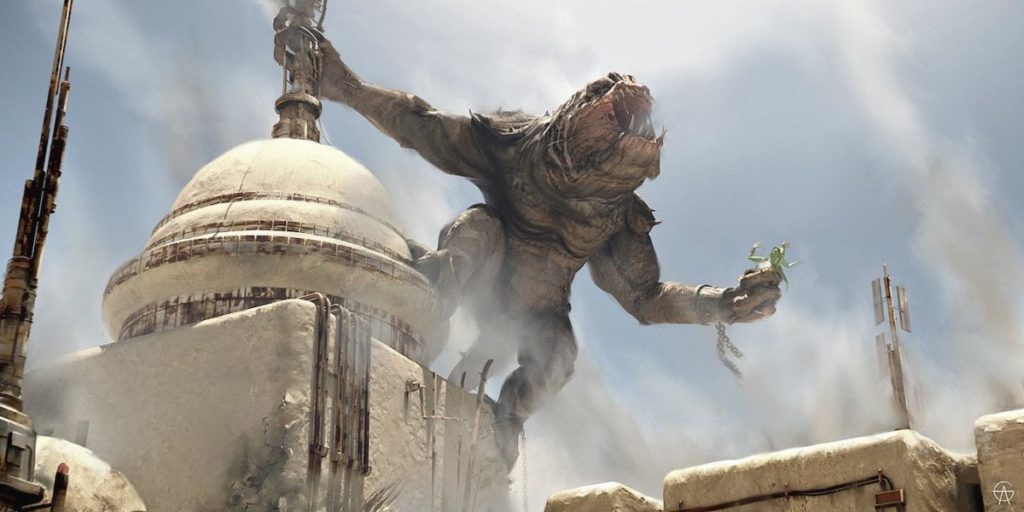
11) Boba Fett Show – Trying to consolidate my thoughts about the Boba Fett show is like trying to consolidate my thoughts about the evolution of the Sports Illustrated swimsuit issue. There’s too much to wrap my brain around. The show, at one point, DITCHED BOBA FETT! For two episodes it just said, “Byyyy-yeee” to its main character! At the same time, it gave me Jabba The Hutt’s twin cousins and Boba Fett riding a Rancor! I don’t hate this show. Yes, I do hate this show. No I don’t. Yes I do! If we’re being totally honest, I don’t think they had any idea what they were doing when they made this show. But it’s got some cool moments and that final episode was pretty darn entertaining.
10) Snoke – While I didn’t love Snoke at the outset, I began to warm up to him. And I thought some of Rian’s best stuff in Episode 8 was Snoke. Until he killed him off. I still contend that there was stuff you could’ve done with this character. I’ve always loved the idea of a crazy Sith hiding out in the Outer Rim, waiting for his moment to take over the galaxy. But Rian ruined all that. I’m guessing this is one many Star Wars fans will disagree with me on. But I always thought Snoke was pretty cool.
9) JJ Abrams – Now that I’ve had a little distance from the new trilogy, I don’t see JJ with the rose-colored glasses I did at the time. But I still think he made a fun first movie that recaptured some of the magic that had been lost in the prequels. Those early scenes of Rey struggling to survive on Jakku worked well. And JJ understood something key about the original movies, which is that they all moved quickly. I also thought he did an amazing job salvaging the franchise from the sarlac pit Rian Johnson hurled it into. That the final film was even cohesive is a testament to his understanding of story.
8) The Mandalorian (The Character) – What’s so interesting about the Mandalorian character is that he’s not very interesting on his own. How can he be? We never see his expression. And he doesn’t talk that much either. A lot of who he is is expressed through his relationship with Baby Yoda. And just the fact that he will fly to the ends of the galaxy to protect this guy makes The Mandalorian lovable. There’s still some weird stuff going on behind the scenes about Pedro Pascale not wanting to wear the helmet and that ruining the climax of the second season when he takes his helmet off (since he already took it off two episodes prior). But there’s no doubt that the character is near the top of the list in the post-Lucas Star Wars rankings.
7) Rey – I always liked Rey. I just never loved Rey. But she was a great underdog character to pin the story on in the first film. And one of the things I thought Rian Johnson did right was the sexual tension he built between Rey and Kylo in the second film. It was a good evolution of her character, and a little unexpected, especially from Captain Bad Idea. Ultimately the character’s inner journey became muddied and we weren’t really sure what she was after. I mean, yeah, she wanted to know who her parents were but since so many people kept coming in and out of the creative process, that revelation kept changing, and you could see it in the way Ridley played the character. With that said, I still think the character was a success.
6) The Mandalorian (The Show) – The Mandalorian show was, without question, a major step forward for the franchise. It proved that you could make Star Wars on a TV budget, even if it was a juiced up Disney Plus TV budget. I think someone said in that article that you’re making Star Wars shows on 1/5 of the features’ budget in 1/3 of the time. You wouldn’t think so watching any of the Mandalorian episodes. And the show introduced this new digital background technology that’s changing the game not just for Star Wars but for all of filmmaking. Not to mention, it had some really fun episodes. My favorite was the one where the Jawas stole the Mandalorian’s ship parts.
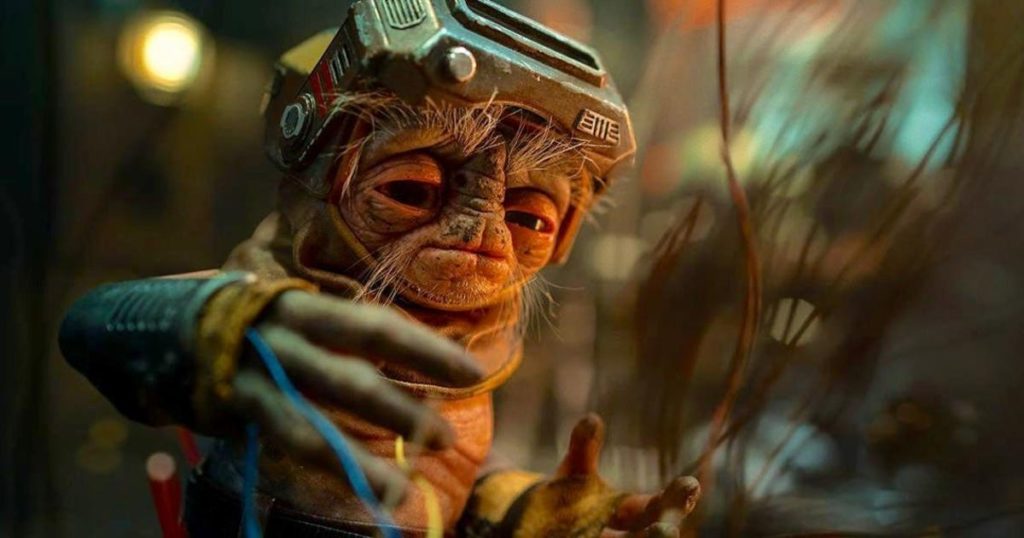
5) Babu Frik – One of the hardest things on a Star Wars production must be when you’ve put everything together and a character who you didn’t think much of at the time turns out to be an amazing breakout character, yet you don’t have the time left to expand their role. Babu Frik was that character in Episode 9. He was so fun. If you could’ve put him on the mission with the guys, he would’ve been comedic gold. Instead we get the giant packet of boring sauce that was Zori Bliss, who had about as much humor in her entire existence as Babu Frik had saying his name out loud. JJ’s ability to create these fun little characters was highly underrated (he did it with D-O as well).
4) BB8 – BB8 was Baby Yoda before Baby Yoda. I remember when I saw that famous Thanksgiving weekend trailer JJ surprised everyone with which featured that shot of this soccer-ball droid shooting across the desert landscape and thinking, “Oh my god. He’s done it! He’s given us a brand new Star Wars story!” It was so exciting. And it was one of the things in the original film that lived up to the trailer. The only thing I don’t like about BB-8 is that there isn’t a Saturday morning cartoon about him and Baby Yoda going on a road trip across the galaxy.
3) Jon Favreau – Jon Favreau is the guy Kathleen Kennedy needed from the start. If he was there giving her advice from the outset, we might’ve seen a completely different trilogy. But Favreau was not the force he was in the industry in 2015 and had to fight his way up through the Star Wars ranks, to get where he is now, which is unofficially running the TV side of the Star Wars universe. I don’t think Favreau is perfect. But he, all by himself, conceived of the first Star Wars character since the original trilogy that became part of the public zeitgeist, in Baby Yoda. For that choice alone, he’s gotta be near the top of the post-Lucas Star Wars rankings.
2) Kylo Ren – Behind that bundle of green joy, Kylo Ren is the biggest risk the post-Lucas franchise took. He’s this young whiney leader of the galaxy. It doesn’t make sense. But you know what they say about big risks? They have big payoffs. The unpredictability of the character brought something new and exciting to the Star Wars universe. We were used to Darth Vader, a guy who was structured and thoughtful about everything he did. Kylo was emotional and impulsive. I loved what that did for the series. It could be argued that Kylo Ren saved Star Wars. If they had gone with a more traditional villain, the trilogy might have been so boring that the franchise was permanently scarred. He’s such an interesting Star Wars character, Kylo. Also, JJ gets major major Star Wars points for casting Adam Driver.
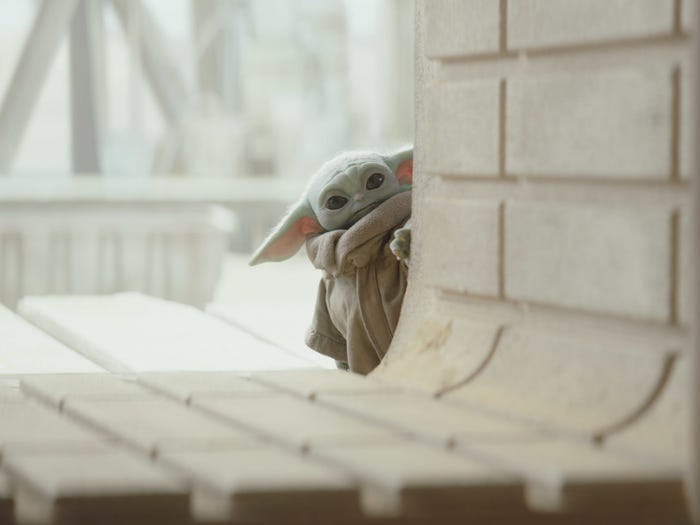
1) Baby Yoda – If there’s one thing everyone can agree on, it’s Baby Yoda. He’s just wonderful. And adorable. This is how I know this character is amazing. I have a friend who haaaaaa-aaates Star Wars. Hates it with every bone in her body. Yet *she* was sending me Baby Yoda memes during The Mandalorian’s run. Seeing Baby Yoda raise his little cute baby claw and channel the force to crush a giant robotic tank — the performance they’re able to get out of that little puppet warms my soul. It really does. It brings me back to the original Star Wars where everything was practical and that practicality contributed to making the universe feel real, because it was real! If you were on set, you could touch it. Favreau understood that. And it’s led to the best thing Star Wars has given us in decades.
Genre: Thriller
Premise: A year after her husband’s death, an adrenaline junkie rock climber finds herself being hunted by a serial killer during a canoe run.
About: This script finished in the bottom half of last year’s Black List. Screenwriter Jeremy Robbins did some writing on the TV show version of The Purge.
Writer: Jeremy Robbins
Details: 96 pages

These scripts are strange beasts.
They’re tailor-made for writing on spec because they’re simple, easy-to-understand, and effortless reads. You can basically keep every paragraph at 2 lines or less.
But they’re deceptively hard sells when it comes to turning them into movies. I just read a really good one recently for a consultation and I’ve been helping the writer send it out. And the note that I’ve gotten back is that it’s “too small.” More specifically I keep getting told that when it comes to action, audiences want that action to be bigger. They don’t want small action. They don’t want one person running from nature, or running from someone else.
So, for these to work beyond getting recognition as a script, they need to have some super marketable angle. A good example would be “The Shallows,” that script about the surfer on the private beach who gets stuck on a rock with a shark swimming around. The shark angle made that marketable.
But hey, who’s to say what anyone will fall in love with, right? Maybe there’s a rock-climbing production head out there dying to make a movie like this.
When we meet 30 year old Sasha, she’s climbing a rock face that would make Alex Honnold anxious. She’s doing so with her husband and I don’t think I need to get into specifics for you to know what happens next. Anybody seen Cliffhanger?
Cut to a year later, after her hubby, who’s name was Tommy if anybody cares, died, and Sasha has become the female version of Alex Honnold, riding around solo in a van, doing the things that adrenaline junkies do. But one thing she doesn’t do anymore is climb rock faces. She’s retired that sediment of her adrenaline-infused life.
Currently she’s about to do a 30 mile solo canoe ride through a very dangerous river. About a mile into the route, however, she notices something very wrong with her canoe. She pulls herself onto shore and sees that someone DRILLED HOLES into her canoe. What in the heck? An hour later, she’s heavily vomiting. Someone poisoned her water!
Sasha comes to the conclusion that while she was camping last night, somebody sabotaged her stuff. And it isn’t long before the saboteur shows up. It’s our Caucasian male villain, Ben, who either is a park ranger or pretended to be a park ranger when Sasha ran into him a day ago. And now he’s hunting her!
Eventually, Ben captures Sasha and makes her climb a rock face with her, before entering a hidden cave. It’s here where Ben keeps his victims, a sort of beautiful cavern with drawings on the walls that have to be thousands of years old.
To make sure she doesn’t escape, Ben handcuff-connects the two with a chain. But that doesn’t stop the feisty Sasha from trying. When he least expects it, Sasha makes a break for the exit, pulling the stumbling Ben along, then leaping off the rock face into the river below.
Ben is eventually able to subdue Sasha once more. But now they’re both injured and need to get medical attention. After deducing where they are, Ben calculates that the fastest way out of the gorge is up a nearby rock face that the two will have to free-solo to the top, connected by rope that ensures if one of them falls… both of them fall.
Today’s script is an interesting comparison piece to yesterday’s script. Because while I did like Apex, I didn’t like it as much as The Bee Keeper.
I asked myself why. Because today’s script is actually a lot more believable than yesterday’s script. I mean yesterday’s script was about bee keeping assassins who use pollen and honey as weaponry.
It goes right back to emotion. Emotionally, I cared more about the characters in The Bee Keeper than I did Sasha.
But why? The entire first scene shows Sasha losing her husband, the person she loves more than anything in the world. Why would I feel more emotion towards a bee keeper getting revenge for a dead neighbor than I would a grieving widow?
The first answer came to me quickly. Unlike in The Bee Keeper, there wasn’t a single reason to show the opening scene of Sasha losing her husband OTHER THAN to make us feel sympathy for her. The trick with mining emotion is that it cannot be obvious that you are manipulating the audience. And this was so so so so so obvious. “PLEASE LOVE MY MAIN CHARACTER! LOOK AT HER LOSE HER HUSBAND RIGHT IN FRONT OF YOUR EYES!”
The reason The Bee Keeper works better is because the opening scene doesn’t just mine emotion from Eloise’s death. It ALSO sets up the plot. Eloise loses money to this company. So that’s the company that the bee keeper goes after. That’s the advantage of doing 2 to 3 to 4 things in a scene, is that it makes the scene more relevant to the overall movie, and therefore less susceptible to looking like a blatant attempt to mine emotion.
It’s no different than when you have a lot of exposition to get out, so you write a scene that’s ONLY ABOUT THAT EXPOSITION. Every reader who reads your script knows you only wrote that scene to get all that exposition out because that’s the only thing the scene focuses on.
As a screenwriter, you have to learn to hide those things.
This goes back to my theory I was positing yesterday. If we’re not hooked emotionally, we’re not going to love your script. We might still LIKE your script. As was the case here. But rarely in the history of movies do people love movies that they’re not emotionally connected to.
The reason I still liked this script is because the technical execution was very strong. I particularly liked that the writer kept changing things up. For example, Sasha evades Ben for a while, then is captured by Ben for a while, then she tries to escape with Ben attached to her (something I’ve never seen before), and finally she and Ben have to work together.
Also, I thought it was clever how the writer exploited his premise. The hook here is the rock climbing aspect. And he gives us some fun rock climbing set pieces, the highlight of which was the free-solo climb with the two connected together so if one screwed up they were both goners.
The writer was also very good at creating suspense. Ben doesn’t just show up out of nowhere. We see a drone that Sasha doesn’t see 10 pages before he arrives. We experience the deliberately drilled holes in her canoe. A lot of writers don’t have the foresight or the patience to slowly build towards an arrival. They just want to jump to the good stuff! YEEHAW! And that’s not as interesting, in my opinion.
But like I said, these are weird scripts. They’re actiony enough to read fast on the page, but put them toe-to-toe with a film like Nobody and its cool-as-f**k bruiser bus battle and they feel small. And as much as I’d like to say I’m not one of those people, I do occasionally run across these “thriller in a forest” posters when I’m scrolling through Netflix or Prime and I think, “Ehhh… feels kind of small potatoes.”
Let me turn the question over to you guys. Do you watch these films? Or do you find them too small?
[ ] What the hell did I just read?
[ ] wasn’t for me
[x] worth the read
[ ] impressive
[ ] genius
What I learned: When you’re describing a character, try to find at least ONE VERY SPECIFIC THING that can give us insight into the character. Because if you describe a character too generally, like with one of these types of descriptions – “JOE, 27, is a bear of a man who looks like he’s had a rough life,” – we don’t get a good sense of what’s unique about that person. Check out how Robbins describes Sasha’s husband: “Inside the second sleeping bag is TOMMY (30s). A SF GIANTS BANDANA is wrapped over his face, a makeshift eye-mask.” Even without describing Tommy himself, we get a sense of this guy. He’s from San Francisco. He’s a sports dude. That’s telling me more than some generic cut-and-paste description that I see in 90% of all other scripts.

